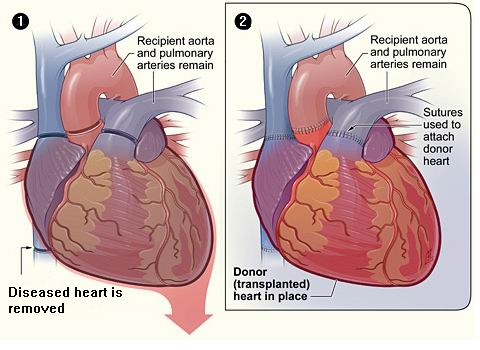A heart transplant is a life-saving surgical procedure in which a diseased or failing heart is replaced with a healthy heart from a donor. This procedure is typically performed on individuals whose hearts are severely damaged and are no longer able to pump blood effectively. Common conditions that may lead to the need for a heart transplant include end-stage heart failure, congenital heart defects, coronary artery disease, and cardiomyopathy.

A heart transplant can greatly improve the quality of life and survival rate for patients with severe heart conditions. However, it is a complex procedure with significant risks and requires a comprehensive evaluation to ensure that the patient is a suitable candidate. Following the transplant, patients must adhere to a strict regimen of medications to prevent rejection and maintain heart function.
Heart failure is the leading cause for heart transplantations, and it can occur due to a variety of underlying conditions. Heart failure is a condition in which the heart is unable to pump enough blood to meet the body’s needs, leading to symptoms such as fatigue, shortness of breath, and swelling.
Common Causes of Heart Failure and the Need for a Heart Transplant:
-
Coronary Artery Disease (CAD): A blockage of the arteries that supply blood to the heart, which can lead to heart muscle damage and heart failure.
-
Cardiomyopathy: A disease of the heart muscle that causes the heart to become enlarged, thickened, or stiff, preventing it from functioning properly.
-
End-Stage Heart Failure: In some cases of heart failure, the heart’s condition becomes so severe that medications, lifestyle changes, and other treatments are no longer effective.
-
Congenital Heart Defects: Some individuals are born with heart defects that may lead to long-term heart damage and necessitate a transplant.
-
Valvular Heart Disease: Conditions such as aortic valve disease or mitral valve disease can cause the heart to weaken over time and lead to heart failure.
-
Arrhythmias: Severe or uncontrolled arrhythmias (irregular heartbeats) that don’t respond to treatment may damage the heart and require a transplant.
-
Infections: Severe infections like endocarditis (infection of the heart lining) can cause heart damage that eventually necessitates a transplant.
Risk Factors:
-
Age: Older age is a significant risk factor for heart disease and failure, though transplants can be performed on younger individuals with severe heart conditions.
-
High Blood Pressure: Uncontrolled high blood pressure can strain the heart and lead to heart failure over time.
-
Diabetes: Diabetes, especially when poorly controlled, increases the risk of heart disease and failure.
-
Obesity: Being overweight or obese increases the risk of cardiovascular disease and other heart complications.
-
Family History: A family history of heart disease or genetic conditions affecting the heart can increase the likelihood of needing a transplant.
-
Smoking: Smoking accelerates the development of coronary artery disease and contributes to the risk of heart failure.
-
Sedentary Lifestyle: A lack of physical activity can contribute to heart disease and increase the risk of heart failure.
Understanding the causes and risk factors can help in preventing heart failure, while also identifying individuals who might need a heart transplant.
Common Symptoms of Heart Failure:
-
Shortness of breath: Difficulty breathing, especially during physical activity or while lying down, is a hallmark of heart failure.
-
Fatigue: Chronic tiredness or weakness, even with minimal exertion, is common in individuals with heart failure.
-
Swelling (Edema): Fluid buildup in the legs, ankles, abdomen, or lungs can cause noticeable swelling, especially in severe heart failure.
-
Chest pain or discomfort: A feeling of tightness or pain in the chest, which may occur during physical exertion, stress, or at rest.
-
Rapid or irregular heartbeat: Arrhythmias, such as atrial fibrillation, may be present in individuals with heart failure.
-
Coughing or wheezing: Fluid buildup in the lungs can cause chronic coughing and difficulty breathing, leading to wheezing sounds.
-
Loss of appetite: A feeling of fullness or a lack of appetite may result from fluid buildup in the abdomen.
If these symptoms are severe and do not respond to medication or lifestyle changes, a heart transplant may be considered as the next treatment option.
A comprehensive evaluation is necessary to diagnose heart failure and determine if a heart transplant is appropriate. The diagnostic process often includes a combination of physical exams, imaging studies, and laboratory tests.
Diagnostic Tests Include:
-
Echocardiogram (Echo): A non-invasive ultrasound test that provides detailed images of the heart’s structure and function, helping doctors assess the severity of heart failure.
-
Chest X-ray: Helps identify signs of fluid buildup in the lungs or an enlarged heart, which are common in heart failure.
-
Electrocardiogram (ECG): Measures the electrical activity of the heart and can detect arrhythmias or other electrical abnormalities.
-
Cardiac MRI: A detailed imaging test that provides more in-depth information about the heart’s structure and function.
-
Cardiac Catheterization: A procedure in which a catheter is inserted into the heart to measure the pressures in the chambers and identify any blockages or other issues affecting heart function.
-
Blood Tests: To check for biomarkers of heart failure, kidney function, and other relevant parameters that can affect treatment options.
After a thorough evaluation, the cardiologist will discuss whether a heart transplant is the best option based on the patient's condition, the severity of heart failure, and other medical factors.
Treatment for heart failure varies depending on the underlying cause, the severity of the condition, and the patient’s overall health. For many patients, lifestyle changes and medications are the first line of defense. However, when heart failure becomes severe and unmanageable, a heart transplant may be necessary.
Non-Surgical Treatment Options:
-
Medications: Medications like ACE inhibitors, beta-blockers, diuretics, and angiotensin receptor blockers can help manage heart failure symptoms and improve heart function.
-
Lifestyle changes: Reducing salt intake, maintaining a healthy weight, regular physical activity, and quitting smoking are crucial for managing heart failure.
-
Implantable devices: In some cases, devices like a left ventricular assist device (LVAD) may be used as a bridge to a heart transplant or as long-term therapy if a transplant is not possible.
Heart Transplant Surgery:
When heart failure reaches an advanced stage and other treatments are no longer effective, a heart transplant may be the best option. During the procedure, the patient's diseased heart is removed and replaced with a donor heart. The success of the surgery depends on several factors, including the patient’s overall health, the availability of a suitable donor heart, and the patient’s ability to manage post-transplant medications.
While not all causes of heart failure can be prevented, managing risk factors can significantly reduce the likelihood of developing the condition. Early intervention and proper management are essential for preventing progression to end-stage heart failure.
Prevention Tips:
-
Control blood pressure: Hypertension is a major risk factor for heart disease and heart failure. Managing blood pressure with medication, diet, and exercise can help reduce risk.
-
Maintain a healthy weight: Obesity increases the strain on the heart and contributes to heart failure. A balanced diet and regular exercise can help prevent obesity.
-
Quit smoking: Smoking accelerates the development of coronary artery disease and increases the risk of heart failure.
-
Exercise regularly: Physical activity strengthens the heart and improves circulation, which can help prevent heart disease and failure.
-
Eat a heart-healthy diet: A diet low in salt, fats, and cholesterol helps prevent the buildup of plaque in the arteries and improves overall heart health.
-
Limit alcohol intake: Excessive alcohol can damage the heart muscle and contribute to heart failure.
Long-Term Management:
For patients with heart failure or those who have undergone a heart transplant, long-term management is essential to prevent complications and maintain a high quality of life. This includes regular follow-up visits, monitoring heart function, and taking prescribed medications.
While heart transplantation can save lives, there are risks and complications associated with the procedure. These include:
Rejection of the donor heart: The immune system may recognize the new heart as foreign and attempt to reject it. This is managed with immunosuppressive medications.
Infection: Immunosuppressive drugs increase the risk of infections, which can be serious after a transplant.
Blood clots and stroke: Patients may be at increased risk of blood clots, which can lead to a stroke or other complications.
Coronary Artery Disease in the New Heart: Over time, the coronary arteries in the transplanted heart may become narrowed or blocked, leading to a condition known as cardiac allograft vasculopathy.
After receiving a heart transplant, patients need to commit to lifelong care and monitoring. Regular check-ups, adherence to medication, and healthy lifestyle choices are vital for the long-term success of the transplant.
Living with a Transplanted Heart:
-
Regular follow-up visits: Frequent visits to the transplant center are necessary to monitor heart function, manage medications, and detect any signs of rejection or complications.
-
Immunosuppressive medication: Patients must take immunosuppressive drugs for life to prevent rejection of the new heart. These medications carry the risk of infection and require careful monitoring.
-
Exercise and physical activity: Most patients are encouraged to resume physical activity gradually after recovery to strengthen the heart and improve circulation.
-
Diet: Maintaining a heart-healthy diet is crucial for long-term wellness and preventing further heart complications.
-
Mental health support: Emotional and psychological support is important to help patients adjust to life with a new heart and the challenges of managing post-transplant care.
With proper care, many heart transplant patients go on to live full, active lives.
The other major cardiac procedures are:
Few popular hospitals for Heart Transplantation are:
Thailand, Malaysia, Singapore, Turkey and India are the most cost effective locations that offer up to almost 80% savings in comparison to the US.
SurgeryPlanet facilitates a plethora of services to the medical treatment traveler also which includes, a hassle free and discounted travel option, a welcome hand at the airport on arrival, travel in an air-conditioned car, round the clock service & support. Your medical evaluation is pre arranged with the least of waiting time. Once your assessment is complete and found medically fit, the procedure is immediately scheduled without a waiting period. Please read through our Services and Testimonials to understand and select your best options.
Cardiomyopathy | Disease Of The Heart Muscle | Coronary Artery Disease | Heart Valve Disease | Congestive Heart Failure | Heart Disease | Abnormal Heart Beats | Allograft | Orthotopic Procedure | Heterotopic Procedure | Cardiopulmonary Bypass | Double Heart | Pulmonary Hypertension | Left Atrium | Heart Transplant | Heart Transplant In India | Heart Transplant Overseas | Risks Heart Transplant | Heart Transplant Low Cost | Heart Transplant Abroad | Heart Transplant In Malaysia | Heart Transplant In Thailand | Heart Transplant Information | Heart Transplant Recovery | Hospital Heart Transplant | Doctors Heart Transplant | Surgeons Heart Transplant | Surgery Heart Transplant | Cost Heart Transplant | Treatment Heart Transplant | Destinations Heart Transplant | Heart Transplant In Singapore | Heart Transplant Overseas | Heart Transplant in Wockhardt Hospitals
SurgeryPlanet is an Healthcare Facilitator and not a Medical service provider. The information provided in this website is not to be used for diagnosis or treatment of any medical condition or use for any medical purposes. We provide information solely for medical travel facilitation and do not endorse any particular health care provider, hospital, facility, destination or any healthcare service or treatment listed. We are not an agent for, or affiliated to any health care provider, or service listed in our website and is not responsible for health care services provided by them. Choice of hospital or doctor for your healthcare services is your independent decision. Consult your domestic licensed health care provider before seeking the services of any health care provider you learn about from our website.


